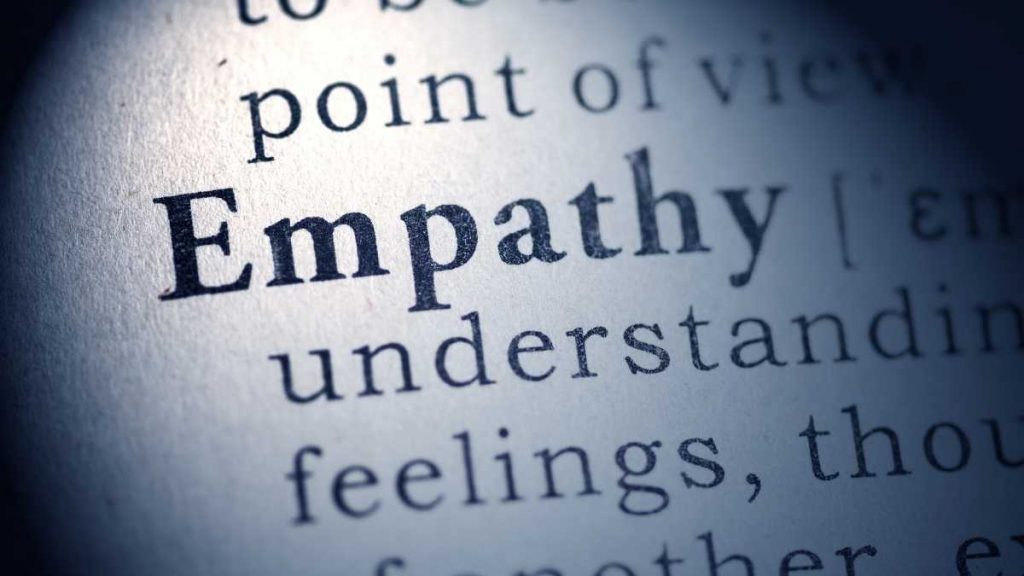How do you teach toddlers empathy?
After all, young children usually behave like pint-sized dictators!
Just because they are demanding, it doesn’t mean toddlers can’t also be empathetic.
Let’s look at 5 ways you can teach empathy to your toddler.
5 Ways To Help Teach Toddlers Empathy

Be Curious While Listening To Their Stories
With concentrated interest, listen. As though their comments might provide critical knowledge that would save your life.
Hold on to their statements with kindness, and let your gestures and language affirm that you are there and fully involved in their experience.
Do only about 20% of the talking and ask probing questions to get what they want and need to communicate.
Listen for a time when your toddler talks about something terrible happening to someone. Ask your child how they would have felt, and ask what they would do to help.
Give Them Full Attention

Give your children complete attention when talking to them.
Keep your phone away!
Staying present also entails shutting out the usual distractions that might take your focus, such as phone notifications.
Give them the type of undivided attention you would want if their circumstances were your own.
Listen Very Carefully
Even if you did your utmost to listen with concentration, kindness, and impartiality, the message might still be misunderstood.
This might be due to a lack of communication on their behalf and a lack of hearing on your part.
The best option is to validate what you remember you heard regularly. For example, hearing someone reiterate the topic in different wording could give your discussion partner a differing opinion.
However, at the very least, verifying the statement and goal keeps the conversation on track.
Be Very Mindful

Be aware because your perception of any circumstance might be distorted. Everyone has assumptions that determine how we perceive the world, yet our judgments can be impenetrable obstacles to empathy.
Making judgments on our own is counterproductive, so let us attempt to be aware instead.
Remember that your perception of a scenario you are unfamiliar with will always be incorrect. Recall a time when you were unfairly misunderstood if you need encouragement, bear this in mind.
Don’t Try To Fix Their Problems.
Individuals lack empathy because they have been uncomfortable addressing somebody else’s issues.
They are unable to solve the problems. Some may conclude that if they can’t fix a problem, what’s the point of talking about it?
As a result, they provide superficial reassurance and comfort without emotional difficulties.
However, as everyone should understand, empathy doesn’t necessitate problem-solving. It is simply a matter of listening and also being present.
It is not even required to speak. Instead, serve as a rallying point where their comments, not yours, are just what counts.
What is Empathy?

Empathy is a form of communication. It demonstrates to children that you are aware of what they are going through.
The term “empathy” refers to a wide variety of emotions. Emotion researchers define empathy as sensing other people’s feelings and envisioning what anyone is thinking or experiencing.
Nowadays, researchers frequently distinguish between two forms of empathy:
- The term “effective empathy” describes the sensations and feelings we experience in reaction to the emotions of others. This might involve reflecting on what another person is experiencing or feeling anxious when we sense another’s dread or worry.
- “Cognitive empathy,” also known as “positive affect,” gives us the ability to recognize and comprehend the feelings of others. According to research, persons with autistic spectrum illnesses have difficulty empathizing.
Why Is Empathy Important?
We all live in a social environment; therefore, empathy for others is essential. Empathy may motivate us all to be attentive, cooperative, and helpful. Empathy also increases our responsiveness.
There is a relationship between those who are empathic as youngsters and those who are more kind and compassionate as they grow older.
Youngsters whose moms are sad exhibited delayed reactions such as songs, words, and body language in tests with children.
When Does Empathy Start?
There are several types of empathy. For example, researchers believe newborns cry in reaction to another infant’s cry, which indicates empathy development.
It is often assumed that empathy manifests itself fully in the two years of life. However, it might arrive much sooner.
Conclusion
Teaching empathy is not easy. Teaching it to a toddler is near impossible!
The good news is, it’s not impossible.
Use the 5 tips on this page to teach empathy to your child and drive it home with random acts of kindness when someone you know needs a little empathy!
Good luck.





